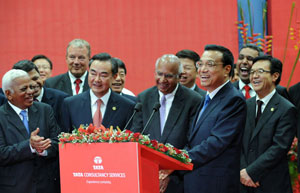Election of Modi sends a positive message
By Ed Zhang (China Daily) Updated: 2014-05-26 07:12China, India can learn from each other's successes and failures
Reform and opening-up shouldn't be just a slogan. Considered as an effort that requires fresh input, one can see that, in some ways, China is not doing as much as it did in Deng Xiaoping's time.
Complacency at times may corrode sensitivities about global developments. Striving for dubious attainments can blur the vision of rising opportunities on the horizon.
The Chinese press, both in print and online, failed to thoroughly report the recent Indian elections, in which Narendra Modi became the country's new prime minister.
Hailed as India's Lee Kuan Yew or Deng Xiaoping, the 63-year-old chief minister of Gujarat state since 2001 is scheduled to be sworn in on May 26 and officially start running the second-most-populous country in the world the day after.
Modi campaigned based on his record in continuously generating faster economic growth for his home state, in western India, than that of most other states. Indeed, that growth probably has been faster and more solid than that of most Chinese provinces, considering that he was working in an environment without massive financial stimuli doled out by the central government.
During the campaign, Modi's message of development was better received across India's social divisions than his competitor's promise of extensive welfare schemes. When he declared that the new government is dedicated to helping farmers, villagers, poor and the lower castes "to fulfill their dreams and aspirations", China should hear him and think.
 |
 |
| Top 10 trading partners of the Chinese mainland | China,India in talks on trade strategy: Li |
- Fixed asset investment to slow in Q2
- China injects 200b yuan subsidy for housing projects
- More lock-up Chinese shares eligible for trade
- Chinese demand keeps driving up New Zealand exports
- E-commerce gives leg-up to ailing steel industry
- SVW upgrades New Polo for new youth
- Feast your eyes on aeroplanes as festival takes off
- Fresh bid to build charging network















